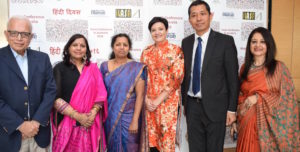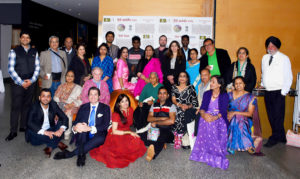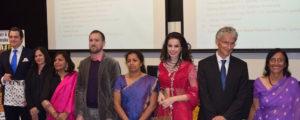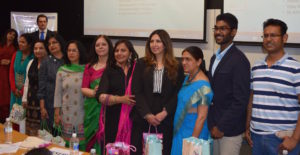A Hindi conference that brought the best from experts on one platform
By Neena Badhwar
Hindi experts in Australia came together for a successful Hindi conference on September 17, 2016 which was attended by selected professionals, academics and youth who have devoted their lives in the promotion of Hindi language in Australia. The occasion was in celebration of Hindi Divas which is held every year on September 14 by the government of India. A souvenir was also released with over 33 speakers who sat on different panels and sessions devoted to Hindi language. Organiser Rekha Rajvanshi thanked Multicultural Minister John Ajaka for the support he gave to the conference and she read his message.
Held at Sydney university with Centre for Continuing Education (CCE) providing the theatre, it was an informative event with sessions that revealed all kinds of teaching and work done in the field of Hindi through school to university level of teaching, media, interpreting and translation, literature and just simple celebration of the official language of India that we all love. The conference proved that, Hindi our mother tongue does not need subsidies, grants for its existence in Australia as many passionate people came up and talked in various panels how they were promoting and helping it to grow its roots here.
Organised by Rekha Rajvanshi, Co-Ordinator, Indian Literary & Arts Society of Australia (ILASA) and Bhartiya Vidya Bhavan the conference opened to Hindi recitation by Amitabh Bachchan on the screen. The two young emcee’s Sanghmitra Kumar and CCE Hindi student David Townsend welcomed all gathered on a platform of this unique gathering of experts from various fields.
The conference started with vandana to Goddess Saraswati by the Hindi and Sanskrit scholar Dr. Meenakshi Srinivasan. The event was declared open to keen Hindi enthusiasts by the Consul General Shri Vanlal Vawna, Hon. MP Jody Mackay, Dr Harinath, Chairman Multicultural Affairs, Hornsby Shire councillor Gurdeep Singh, Strahfield Shire Councillor Raj Datta, and Dr. Ian Woolford, Professor at La Trobe university teaching Hindi literature. and Anita Barar, SBS Hindi Radio broadcaster from Melbourne and Dr. Meenakshi Srinivasan. Mr. Vawna spoke in Hindi about the language, its importance and a language spoken by half a billion population of the world. Gurdeep Singh mentioned how Hornsby Library’s Hindi book section there had recently bought Hindi books worth $40,000. Dr. Harinath mentioned the role of bhojan and bhasha to connect to one’ s roots.
The emcees introduced Sheba Nandkeolyar, National Chair AIBC, spoke about the role of Hindi in bilateral trade. Mr. Vawna spoke in Hindi about the language, its importance being spoken by about half a billion people of the world.
Said Sheba, “Hindi helps a lot in bilateral relations when people can see that one is making an effort to speak in their language. In fact I have proposed that all the business delegations which visit India must be given a short course on Hindi before they land up there.”
“India’s GDP stands at 7.6 per cent and is sure to rise further with Prime Minister Modi at its helm who performs like a corporate head,” said Sheba.
Dr. Woolford chaired the first session and read a poem ‘Desh or Ghar’ where the writer is still exploring himself while exploring the worlds. Dr. Meenakshi Srinivasan, Dr Mark Allen who teaches Sanskrit at Sydney university spoke about hurdles Hindi is facing at university level and issues with university funding with Professor Kama Mclean who teaches Indian Studies at UNSW also expressed similar views.
Dr Meenakshi mentioned how a language needed six ways of teaching through Shabartha, Bhavartha, Lakshyartha and more for advance learning and that it needs Sanskrit, India’s Latin language which deals in a thorough manner the rules of teaching a language. Neena Badhwar said that Hindi had to be in context of teaching it in Australia and that it should take the student from his known world to the unknown vast world of Hindi.
Rekha Rajvanshi’ two university students, David Townsend, a PhD student of Law, and Tammy Bartia who wants to work in Bollywood, gave talks in Hindi about their experiences while learning the language and their reasons to learn Hindi.
The conference unfolded many speakers as teachers, writers, media persons and interpreters and translators. Teaching methods, resources, poems, films, works in Hindi were all shared by them through their collections and power point presentations that compiled years of materials collected in all forms and used to promote the cause of Hindi.
Mothers, now qualified teachers, have taught Hindi not only at home to their kids but also in community schools for years on end. Writers who are qualified NAATI interpreters and translators have helped people in distress at hospitals, at medical check ups, even once an interpreter was asked to interpret for a brothel services used by someone.
At university level while Hindi is taught as part of the Indian Studies, Hindi has not found enough support and funds to be taught as a full blown university subject. This was the opinion of Dr. Ian Woolford and Professor Kama Mclean and Dr. Mark Allen. In schools, like the community Sunday or Saturday schools where Hindi is taught, it having finally moved to government run Saturday schools. It is now slowly entering into regular school system due to the great efforts put in by people such as Mala Mehta, Kamlesh Chaudhary, Archana Chaudhary, M K Singh, Alka Sood, Kulwinder Kaur, Vandana Gupta, Aakash Prasad, Sudesh Verma, Saritha Chekuri have all proved with their dedication that Hindi has a place here and a respectful one with its legacy passed on to the second and third generation due to their dogged work and vision for many years. If on one hand they have become grandmas and grandpas teaching Hindi and are referred to as ‘aunties’, ‘uncles’ and ‘Nanis’ by the children. Students such as Aakash Prasad who learnt Hindi is now teaching it to children in the same school where he himself studied. Aakash, being a young man, is able to introduce language learning through the use of technology.
Mrs. Mala Mehta talked about her IABBV Hindi school and how NSW has not yet signed for the national Hindi curriculum developed by ACARA to be adopted in NSW schools.
Anita Barar, SBS Radio broadcaster, talked about Hindi and showed her documentary on people from India and Pakistan caught in the partition of two nations in 1947. Rekha Rajvanshi showed her translation of aboriginal Dreaming stories in Hindi that were played on an animation film. Pallavi Jain Sydney’s Hindi radio broadcaster at SBS talked about producing items of Hindi news of interest to the community.
Interval allowed on excellent Indian food served by Surjit’s Indian restaurant everyone to mix, mingle and talk about Hindi and get pictures taken on a press wall celebrating Hindi Divas.
Anita also talked in literature session on the great poet Nirala and Anil Verma read poetry of Jai Shankar Prasad and Dinkar. Rajeev talked about Hindi during the Bhakti period and the poetry of Surdas and Meera. Dr. Shailja Chaturvedi talked about her poetry and her work for magazine ‘Chetna’ that she edited for Hindi Samaj. Santram Bajaj, a local Hindi writer, read his humour article that brought laughs.
Interpreter and Translator session was informative with Neena Sinha, Madhu Aggarwal, Rekha Rajvanshi and Meenakshi giving insights about the use of Hindi in medical problems, court cases and people caught in other difficult yet much needed circumstances.
Dr. Yadu Singh spoke how the community was not working together on a united front to help forward the cause of Hindi. Hindi comes in all forms and accents as the language is richly spoken and expressed in various ways from Kashmir to Kanyakumari and now here in Australia.
Without judging how people speak the language, Shuddh or Bhojpuri or Fijian Hindi or even with a regional accent, one could see by the end of the day that Hindi is very much here in Australia and is due to the dedication, hard work of some passionate members and simply because they love Hindi. Some having stood outside schools, like Kamlesh Chaudhary, who convassed at school gates by getting the petition signed by the parents of Hindi speaking homes to introduce Hindi in schools where their children study.
Short URL: https://indiandownunder.com.au/?p=7457




